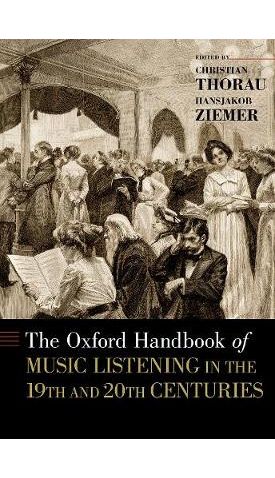אנו משתמשים ב-Cookies כדי לשפר את החוויה שלך. כדי לקיים ההנחיה החדשה של e-Privacy, עלינו לבקש את הסכמתך להגדיר את ה-Cookies. קבלת מידע נוסף.
588.00 ₪
The Oxford Handbook of Music Listening in the 19th and 20th Centuries
588.00 ₪
ISBN13
9780190466961
יצא לאור ב
New York
עמודים
536
פורמט
Hardback
תאריך יציאה לאור
17 בינו׳ 2019
שם סדרה
Oxford Medical Handbook
This Handbook delves through two centuries to enable a different conceived history of listening practices.
An idealized image of European concert-goers has long prevailed in historical overviews of the nineteenth and twentieth centuries. This act of listening was considered to be an invisible and amorphous phenomenon, a naturally given mode of perception. This narrative influenced the conditions of listening from the selection of repertoire to the construction of concert halls and programmes. However, as listening moved from the concert hall to the opera house, street
music, and jazz venues, new and visceral listening traditions evolved. In turn, the art of listening was shaped by phenomena of the modern era including media innovation and commercialization.
This Handbook asks whether, how, and why practices of music listening changed as the audience moved from pleasure gardens and concert venues in the eighteenth century to living rooms in the twentieth century, and mobile devices in the twenty-first. Through these questions, chapters enable a differently conceived history of listening and offer an agenda for future research.
| עמודים | 536 |
|---|---|
| פורמט | Hardback |
| ISBN10 | 0190466960 |
| יצא לאור ב | New York |
| תאריך יציאה לאור | 17 בינו׳ 2019 |
| תוכן עניינים | The Art of Listening and Its Histories: An Introduction Christian Thorau and Hansjakob Ziemer Section I: Listening Behaviors and Emotions 1. Who Cares if you Listen? Researching Audience Behavior(s) in Nineteenth-Century Paris Katharine Ellis 2. The Well-Mannered Auditor: Zones of Attention and the Imposition of Silence in the Salon of the Nineteenth Century James Deaville 3. The Problem of Eclectic Listening in French and German Concerts, 1860-1910 William Weber 4. The Crisis of Listening in Interwar Germany Hansjakob Ziemer 5. Listening as a Practice of Everyday Life: The Munich Philharmonic Orchestra and Its Audiences in the Second World War Neil Gregor Section II: Listening Ideologies and Instructions 6. Turning Liebhaber into Kenner: Forkel's Lectures on the Art of Listening, c. 1780-1785 Mark Evan Bonds 7. Designated Attention: The Transformation of Music Announcements in Leipzig's Concert Life, 1781-1850 Anselma Lanzendoerfer 8. Concert Listening the British Way?: Program Notes and Victorian Culture Christina Bashford 9. "What ought to be heard": Touristic Listening and the Guided Ear Christian Thorau Section III: Listening Spaces and Encounters 10. Architectural Acoustics and the Trained Ear in the Arts: A Journey from 1780 to 1830 Viktoria Tkaczyk and Stefan Weinzierl 11. Amateurs and Auditors: Listening to the British Musical Festival, 1810-1835 Charles Edward McGuire 12. The Intimate Art of Listening: Music in the Private Sphere during the Nineteenth Century Wolfgang Fuhrmann 13. Symmetries in Spaces, Symmetries in Listening: Musical Theater Buildings in Europe around 1900 Gesa zur Nieden 14. Music in the Air-Listening in the Streets: Popular Music and Urban Listening Habits in Berlin around 1900 Daniel Morat Section IV: Listening and Technologies 15. From the Music-Telegraph to the Opera-Telephone-Listening to Music in the Late Nineteenth and Early Twentieth Centuries Sonja Neumann 16. First Re-Creations: Psychology, Phonographs, and New Cultures of Listening at the Beginning of the Twentieth Century Alexandra Hui 17. Between Personal Experience and Public Discourse: Reproduced Music and the Politics of Listening in the Twentieth Century Axel Volmar Section V: Towards an Art of Listening of the Twenty-First Century 18. Capturing the Landscape Within: On Writing the History of Experience James H. Johnson 19. Listening and Possessing Fred Maus 20. Is Listening to Music an Art-or Not? Wolfgang Gratzer 21. "Performer or listener, everybody in the concert hall should be devoted entirely to the music": On the Actuality of Not Listening to Music in Symphonic Concerts Christiane Tewinkel |



Login and Registration Form